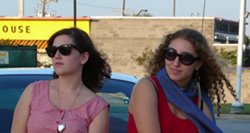Left Forum: Continuing the Conversation
In March, I got invited to speak on behalf of "young feminists" at the Left Forum, an annual conference of lefty intellectuals, activists, writers, and organizers held at Cooper Union in New York. The panel was called "The Pleasure Frontier: An Intergenerational Dialogue on Sex in Feminism" and consisted of me (in the middle); Jennifer Baumgardner (right), the thirtysomething Third Wave feminist activist, author and filmmaker; and Loretta Ross (left), Second Wave-era feminist and founder of the National Coordinator of the SisterSong Women of Color Reproductive Health Collective. The room at Cooper Union was packed--people sitting on the floor and in windowsills, latecomers hanging in the doorways. The brief panel was followed by--I'm not kidding--a 1.5 hour-long question and answer session.

Anger and confessions spilled out of people's mouths, as arguments bounced across the room. Hands shot up everywhere: Can stripping and porn ever be feminist? Why is incest ignored by the media? Are women of color too oversexualized to be included in the feminist conversation? Jennifer, Loretta and I felt a palpable generational gap. There were audible "tsks" in reaction to what I had to say about teenage sex and modesty. I could feel the tension, rage, and passion in this tiny little classroom, and I left with a strange mix of defeat and satisfaction.
It proved to me that once again, feminists are their own worst enemies. It seems to take unfathomable amounts of compromise to please women from all over the spectrum. But it also showed me that feminism--sex-related or not--is still a hot topic. It is one that women care about and want to tackle head-on. People (yes, men too) get riled up about these issues. Sex was just a way to get the fire going, but judging by the profusion of hugs and thanks yous I got after the panel, it will continue to burn.
-NWA
*Look out for the next installment of Emma's Contemporary Art and Feminism series next Wednesday.























